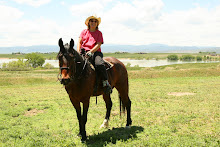Tim asked me this morning if I could explain to him more about what happened yesterday (see 3/17) on the way home, what I was feeling, and what he might have said differently at the time to help me. When Brego took off faster, he wasn't going all that fast--he wasn't even cantering, just gaiting really fast while looking sideways, and in my opinion out of control. However, it made me tense and all I wanted to do was slow him down or stop, but he wasn't responding. That was what made me nervous. Apparently I just wasn't pulling hard enough on the rein (one rein) to get him to slow or stop. He has a habit of continuing to go forward with his head sideways if I don't get his head in tight enough, and I have difficulty tugging him in because I'm afraid he'll twist around too much or get his feet in a hole or a bush or something.
So I was dealing with fear and lack of experience. I wish I could reproduce these kinds of things in our pasture where it's safe, so that when I'm out I react more quickly with the right actions! But, experience and practice are the ticket... So, what could we have done better at the time? I just wanted to stop or slow down, and eventually we did. As a woman (and still a novice), I was dealing with my emotions. I needed to calm myself down probably more than calm Brego. As I thought it through, I realized it really wasn't that big of a deal, Brego wasn't going all that fast and possibly just trying to catch up to Tim & Strider, and we weren't really out of control. Perhaps if I think more reasonably (and more quickly), I won't get so nervous and will respond more appropriately to the situation.
Bottom line is, "get over it and move on". It's just that with me (women, in general), getting over it and moving on isn't so quick & easy. I think that thinking these things through rationally should help for faster responses in the future, as well as working with him more and more here at home. If I could get him to act nutty here in the pasture and then stop him safely, that would be great!
As we talked about it, Tim realized that men aren't so easily disturbed about these kinds of things and tend to move more into "fix it" mode, while women react more with emotions and just want to stop and go home. Understanding this may help us both next time, and may help Tim in his training experiences with women. I suppose this conversation was prompted by listening to Karen Scholl last weekend explaining how differently men and women deal with these kinds of issues. I'm sure it's helpful to some degree to think about and talk about our reactions, but I don't want to over-analyze to the point of being a broken record or boring. I want to learn and grow, get over it and move on!


No comments:
Post a Comment